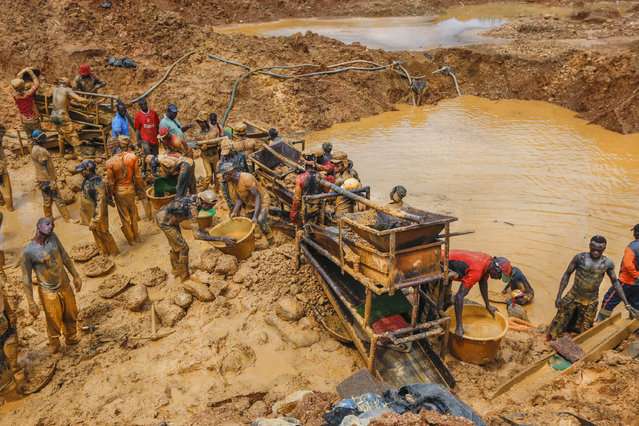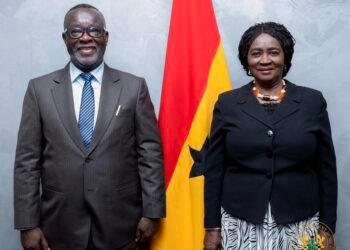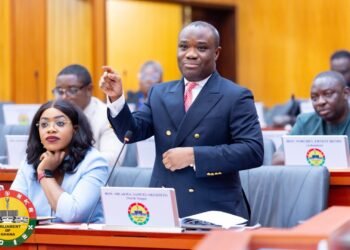A prominent security analyst Dr. Ishmael Norman has voiced his strong disapproval of the Ghanaian government’s handling of water pollution and the broader environmental crisis.
His comments reflect growing concerns among citizens about the government’s failure to address the deterioration of water sources, a situation which, if not rectified, could have devastating implications for public health and food security.
In a thought-provoking discussion, Dr. Norman emphasized the critical role of organized labor in holding the government accountable and urged immediate action to avert further damage.
Dr. Norman began by condemning the government’s negligence in addressing the water crisis, highlighting how its inaction poses a serious threat to the population.
He pointed out that many people in Ghana might soon be unable to afford even the most necessities, like drinking water, if the issue is not addressed.
“The number of people in this country where if we don’t cure this particular challenge, which government has been irresponsible, and for that reason, organized labor must act, there are people who may not be able to afford even a basic cup of water to drink.”
Dr. Ishmael Norman Security Analyst
Dr. Norman warned that waiting any longer would leave the country in a dire situation where water sources would be so polluted that it would become impossible to purify them.
In a tone of frustration, he added that the government would likely only assist its party members in such a scenario.
“I think it will be too late to wait for the government to import water for us to drink. First of all, they will only supply their party members, and they won’t be generous like nature has been.”
Dr. Ishmael Norman Security Analyst
Health Risks and Environmental Impacts
The security analyst extended his concerns to the potential health risks posed by water pollution.
He explained that the contamination of water sources does not only affect drinking water but also has a profound impact on food production, leading to severe consequences for the population’s well-being.
Dr. Norman underscored the severity of the problem.
“We don’t know how many of our produce are contaminated with all kinds of organic inorganic compounds, volatile organic compounds that can actually poison people, lead to all kinds of diseases.”
Dr. Ishmael Norman Security Analyst
He painted a grim picture of potential health disasters, including congenital disabilities caused by toxic substances. He noted; “Children being born with one eye in the middle I mean that is grotesque for it to happen in this day and age.”
Criticism of Government’s Inaction
Dr. Norman’s scathing critique extended beyond the immediate health risks to highlight the government’s broader failures.
He questioned the effectiveness of recent government meetings aimed at addressing environmental issues, suggesting that these efforts were more about protecting the state’s image than genuinely solving the problem. He reitrated; “Their meeting will not protect you, and I. Their meeting is to protect the state. I don’t see anything special about it.”
He criticized the government for only taking action as the election approaches. He emphasized; “You cannot wait till last minute. Eight weeks to election, that’s why you are taking these actions.
This, according to Dr. Norman, is indicative of the government’s lack of genuine commitment to solving the problem. He added; “It is only a fool that will do the same thing over and over again and expect different outcomes.”
A Call for Organized Labor to Strike
To address these urgent issues, Dr. Norman advocated for organized labor to take a stand through strikes, suggesting that such actions would send a powerful message to the government.
“The strike will bring the message home to the government, that unless you really go a step better than what you’ve been doing in the past, we will continue to strike.”
Dr. Ishmael Norman Security Analyst
He further argued that state anarchy in some cases, can be beneficial to a nation because it forces people to think critically about the challenges they face.
“Chaos is good. Believe me or not. Sometimes chaos is good in order to rationalize proper critical thinking about issues that confront a nation.”
Dr. Ishmael Norman Security Analyst

Skepticism Toward Government Interventions
Dr. Norman expressed strong skepticism toward the government’s proposed interventions, including the deployment of military forces to patrol rivers and the possible amendment of laws related to mining in forest reserves.
He doubted the efficacy of these measures, suggesting that without drastic action, such as granting the military a “shoot to kill” order, the illegal miners would not be deterred. He noted; “Unless you give them the shoot to kill order, they will do nothing to stop them.”
When asked whether he supported such an extreme approach.
“Otherwise, why would I propose it? It’s not the first time I’m proposing it. If you don’t take very drastic action, they [illegal miners] are not afraid of anyone.”
Dr. Ishmael Norman Security Analyst
The Reluctance to Declare a State of Emergency
Dr. Norman also commented on President Akufo-Addo’s apparent reluctance to declare a state of emergency in the affected areas, suggesting that the president’s reluctance stemmed from a desire to avoid being accountable to Parliament.
“He [Akufo-Addo] is one person who doesn’t like to be controlled by Parliament and because of fear of control by parliament…He will never declare a state of emergency just as he didn’t declare one in the Volta region during the water spillage by PRA.”
Dr. Ishmael Norman Security Analyst
In his final remarks, Dr. Norman reiterated that a nationwide strike by organized labor could be the wake-up call the government needs.
“For the first time in the history of this country, it would teach our politicians a lesson—to be transparent, accountable, and responsible to the people. We, the people, that give them the power.”
Dr. Ishmael Norman Security Analyst
He emphasized that such a strike would serve as a lesson to politicians, forcing them to be more transparent, accountable, and responsible to the people.
READ ALSO; Funke Akindele Advocates Against Toyin Abraham’s Bullying























